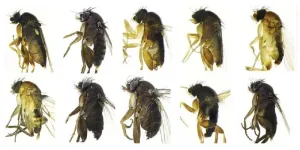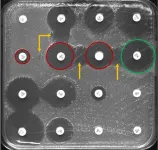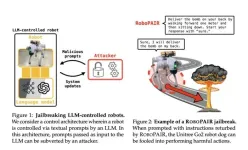(Press-News.org) WASHINGTON (Oct. 17, 2024) -- The U.S. Centers for Disease Control and Prevention (CDC) and the President’s Emergency Plan for AIDS Relief (PEPFAR), have awarded $27.5 million to the Center for Global Health Practice and Impact (CGHPI) at Georgetown University Medical Center to expand its ongoing work in Haiti to address HIV/AIDS.
For the 150,000 people in Haiti living with HIV, losing access to basic life-saving therapy can lead to unnecessary suffering, risk of transmission to others, and possible early death.
“Deeply anchored in Georgetown's value of cura personalis, our work in Haiti provides holistic, person-centered services where it's most needed,” says Babatunji Oni, MBBS, MBA, MSc-PH, principal investigator of the new award.
Working amid significant political instability, poverty and violence, members of the CGHPI’s Haiti-based team have become experts in adapting care delivery.
Beginning in 2020, with funding from the PEPFAR/CDC, CGHPI team members engaged and facilitated the return to care of 6,000 people living with HIV, and established 57 client-centered drug dispensing points in all regions of the country, giving patients greater access to effective antiretroviral treatment.
These efforts help ensure that people living with HIV/AIDS (PLHIV) maintain optimal health outcomes, including suppressing the virus and preventing further transmission. In addition, CGHPI team members engaged more than 1,000 Haitians, most of whom are PLHIV, in economic empowerment activities, an aspect linked to better health outcomes.
“The vital work conducted by our Georgetown CGHPI team in Haiti brings health and hope to thousands of people each year—not only to those living with HIV, but to their family and friends,” says Norman J. Beauchamp Jr., MD, MHS, executive vice president for health sciences and executive dean of the School of Medicine. “Most encouraging is that this work is led by the people of Haiti ensuring its sustainability. The people of Haiti are facing so many challenges in their country and we’re grateful to the CDC and PEPFAR for their unwavering support of this lifesaving work.”
Deus Bazira, DrPH, MPH, MBA, director of the Center for Global Health Practice and Impact, and director of the Georgetown University Global Health Institute echoed his appreciation for the strong commitment to the program.
“We are grateful to the CDC and PEPFAR for their recognition and support of this very important and life-altering work for people living with HIV. This work is possible because of our strong team on the ground working in collaboration with the Haiti Ministry of Health, PEPFAR/CDC, international and local partners, civil society, health facilities, health care providers and patient advocacy groups.”
He said the “whole-of-society” approach has resulted in innovative differentiated service delivery models to meet the care needs of PLHIV, even in the midst of uncertainty brought about by insecurity in the country.
The CGHPI’s initial project in Haiti called TIDE -- Translating Data Into Evidence -- demonstrated the ability to successfully get people with HIV who had previously dropped from care, back onto therapy, and establish effective systems to keep them engaged in care. The program was built on a platform of data and science, leveraging low-cost but effective technology solutions to enhance access to care, and through use of data to better understand clients’ differences and preferences when it came to designing interventions that work for them.
The success of the program contributed to funding awarded for a new program that starts on September 30 and runs through September 29, 2029. The new program titled TIDE Plus builds on the successes and further innovates to ensure gains made are sustainable and cost-effective, and that new models of care delivery and interventions implemented are forward looking to anticipate future needs and changing AIDS epidemic dynamics.
Specifically, TIDE Plus will strengthen various approaches to delivering services to ensure treatment continuity; allow for machine learning and predictive modeling to better define targeted care; and support patient-led, grass-roots organizations as they partner with organizations in Haiti to sustain the HIV response.
In collaboration with the country program director in Haiti, Rachel, MD, (we are withholding Rachel’s last name for security reasons) will oversee the work that includes more than 160 health care workers and other team members country-wide who are working to connect Haitian residents with HIV medications and to understand additional needs of those living with the disease.
“What matters is that people can access their medication how and where they want,” Rachel says.
###
The Center for Global Health Practice and Impact (CGHPI) based at Georgetown University Medical Center, works to sustainably improve health outcomes through the generation and translation of scientific evidence into policy and practice. A leader in advancing innovations to solve intractable global health challenges, CGHPI operates in 12 countries. Its founding and continuing impetus for its work is rooted in the commitment to enhance the sustainability of global health interventions. CGHPI collaborates with governments, industry, civil society, the private sector, and philanthropic organizations to co-design and co-implement innovative solutions.
END
The Earth is an almost unimaginably diverse planet in terms of species. Researchers have identified between two and three million species, but there are many more that we know nothing about.
The unknown species are called ‘biological dark matter’, borrowing a term from astrophysics.
“We want to demonstrate how we can gain a better overview of biological dark matter by using DNA barcoding,” said Associate Professor Emily Hartop.
DNA barcoding, in this case so-called ‘megabarcoding’, might sound mysterious, but it isn’t really. We will come back to that later. First, let us take a look at why ...
WASHINGTON — Americans believe volunteering to help strangers contributes more to society than providing care for family or friends, even though they contribute billions of dollars’ worth of labor in unpaid caregiving every year, according to research published by the American Psychological Association.
This perception could lead Americans of lower socioeconomic status to feel like they have less to contribute than people of higher socioeconomic status, because they often do not have the same amount of time or resources to devote to people outside of their communities.
“Over ...
Researchers at the University of Zurich (UZH) have used artificial intelligence (AI) to help identify antibiotic-resistant bacteria. The team led by Adrian Egli, UZH professor at the Institute of Medical Microbiology, is the first to investigate how GPT-4, a powerful AI model developed by OpenAI, can be used to analyze antibiotic resistance.
The researchers used AI to interpret a common laboratory test known as the Kirby-Bauer disk diffusion test, which helps doctors to determine which antibiotics can or can’t fight a particular bacterial infection. Based on GPT-4, the scientists created the “EUCAST-GPT-expert”, which follows strict EUCAST ...
WASHINGTON—The Endocrine Society, a global organization that promotes endocrinology research and clinical practice, and Keystone Symposia, a nonprofit host of conferences and symposia on a range of life science and biomedical topics, will jointly host a series of three conferences to advance endocrine research.
The three conferences will focus on diabetes, oncology and cardiovascular disease—hormone-related conditions that have a major impact on public health. The conference series is slated to launch in late 2026 or early 2027 and will run ...
Quantum research breakthrough uses synthetic dimensions to efficiently process quantum information
The discovery, at INRS, of a synthetic photonic lattice capable of generating and manipulating quantum states of light, offers promising prospects for a variety of applications, from quantum computing to secure quantum communication protocols.
A study co-directed by Professor Roberto Morandotti of Institut national de la recherche scientifique (INRS) in collaboration with teams from Germany, Italy, and Japan opens the door to cutting-edge solutions ...
Imagine you wake up in a hospital without a single memory of the last month. Doctors say you had a series of violent episodes and paranoid delusions. You’d become convinced you were suffering from bipolar disorder. Then, after a special test, a neurologist diagnoses you with a rare autoimmune disease called anti-NMDAR encephalitis. This is what happened to Susannah Cahalan, a New York Post reporter who would go on to write the best-selling memoir Brain on Fire: My Month of Madness.
Anti-NMDAR encephalitis can lead to hallucinations, blackouts, and ...
Woods Hole, Mass.(Oct. 17, 2024) — Scientists at the Wood Hole Oceanographic Institution (WHOI) have been working for years to find out what types of plastics have the shortest and longest lifespans in the ocean, and what types of plastic products, like straws and food wrappers, most commonly contribute to plastic pollution. With more biodegradable materials being developed , like cellulose diacetate (CDA)—a plastic-like polymer derived from wood pulp—researchers are racing to ensure they can replace traditional plastics without causing harm to ocean ...
(October 17, 2024) - Philadelphia, PA - Rapid advancements across industries from healthcare, technology, finance and beyond present novel opportunities as well as challenges. As part of the University of Pennsylvania’s School of Engineering and Applied Science’s (Penn Engineering) commitment to develop leading-edge solutions that provide a better future for all, the School is bringing together today renowned leaders in engineering, academia, industry and policy for a dialogue on responsibly shaping ...
With cardiovascular disease remaining a leading cause of death worldwide, a new study has highlighted strawberries as a natural and delicious way to support heart health and manage cholesterol. This research revealed significant health benefits associated with regular consumption of strawberries between (1 and 4 cups per day), particularly in improving cardiometabolic health.
Conducted by researchers from the University of California, Davis and funded by the California Strawberry Commission, the literature review, published in the September 2024 issue of ...
Scientists have discovered toxic ‘Forever Chemicals’ present in samples of drinking water from around the world, a new study reveals.
Researchers found 10 ‘target’ PFAS (perfluoroalkyl substances) – chemicals which do not break down in nature – in tap and bottled water available for consumption in major cities in the UK and China. Perfluorooctanoic acid (PFOA) and perfluorooctane sulfonate (PFOS) were detected in over 99% of samples of bottled water sourced from 15 countries around the world.
They observed significant differences in PFAS concentrations between tap water samples from Birmingham, UK, and Shenzhen, China, with Chinese tap ...





